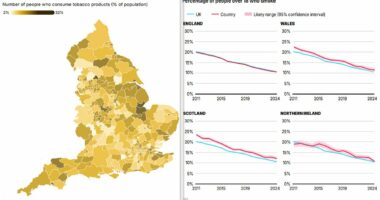Share this @internewscast.com
Handwriting Brain Connections Learning writing out the same word again and again in cursive may bring back bad memories for some, but handwriting’s impact on brain connectivity and learning is significant, according to a recent study.
When asked to handwrite words, college students showed increased connectivity across the brain, particularly in brain waves associated with memory formation, compared with when they typed those words instead, researchers report as of January 26 in Frontiers in Psychology. The finding adds to growing evidence of handwriting’s benefits and could give fodder to laws that implement handwriting curricula, such as the recently enacted California law requiring the teaching of cursive in grades 1 through 6.

The new study reveals that “there is a fundamental difference in brain organization for handwriting as opposed to typing,” says Ramesh Balasubramaniam, a neuroscientist at the University of California, Merced who was not involved with the study.
Plenty of previous research has shown that handwriting improves spelling accuracy, memory recall, and conceptual understanding. Scientists think that the slow process of tracing out letters and words gives individuals more time to process the material and learn.
In the new study, psychologists Audrey van der Meer and Ruud van der Weel, both at the Norwegian University of Science and Technology in Trondheim, recruited students from the university and stuck electrodes on their heads. The researchers asked the students to type out or handwrite in cursive with a digital pen a word that appeared on a computer screen. Sensors in a cap recorded electrical brain activity while participants carried out each task.
Then the scientists looked for coherence, which is when two brain areas are active with the same frequency of electrical waves at the same time. This parameter can reveal the strength of functional connectivity among different regions across the brain.
With handwriting, the researchers saw increased activity, specifically in low-frequency bands called alpha and theta, not only in the expected motor areas due to the movement but also in others associated with learning. These low-frequency bands have previously been shown to support memory processes. When the team compared the two tasks, they realized that handwriting — but not typing — increased the connectivity across parietal brain regions, which are involved in sensory and motor processing, and central ones, many of which are involved in memory. These findings suggest that there are distinct processes of brain activation happening while a person types or writes.
“Even when the movements are very similar, the activation seems much, much higher in handwriting,” Balasubramaniam says. “It shows that there’s more involvement of these brain regions when you’re handwriting, which might give you some specific advantages.”
The researchers posit that this boost of stimulation facilitates learning because these particular waves between these areas are implicated in memory formation and encoding.
Because the team did not test whether participants remembered the words, it’s not yet clear how exactly the increased activity impacts learning, says psychologist Kathleen Arnold of Radford University in Virginia. “[The study] warrants some follow-up to see what exactly is causing those connectivity differences and whether or not they reflect learning outcomes.”
Balasubramaniam also notes that it’s possible the differences in brain activation are merely due to the unique movement required to type or write. “But that said, we’ve got to start somewhere, and these are the first results to actually show that these two things have different brain activation patterns.”
And although handwriting may help with learning processes, typing is often easier, faster, and more practical. Students and teachers alike should therefore consider the task at hand to inform their decision to handwrite or type, van der Meer says. For example, using handwriting to take notes might help retain information better while typing out an essay may be easier.
Despite the need for more studies to determine the optimal learning strategy, experts say that handwriting shouldn’t be left behind in the digital age. “[Schools] need to bring in more writing into curriculum design,” Balasubramaniam says.
Van der Meer agrees. “[Writing is] so good for [young] brains, so we shouldn’t use [this generation] as guinea pigs to see how their brains end up without any handwriting,” she says. “And it’s important for them to be able to at least write a grocery list or a love letter. I really think that that is important for us humans.”
CITATIONS
A. van der Meer and F.R. van Der Weel. Handwriting but not typewriting leads to widespread brain connectivity: a high-density EEG study with implications for the classroom. Frontiers in Psychology. Published online January 26, 2024. doi: 10.3389/fpsyg.2023.1219945.
N.A. Herweg, E.A. Solomon and M.J. Kahana. Theta oscillations in human memory. Trends in Cognitive Sciences. Vol. 24, March 2020, p. 208. doi: 10.1016/j.tics.2019.12.006.
P.A. Mueller and D.M. Oppenheimer. The pen is mightier than the keyboard: advantages of longhand over laptop note taking. Psychological Science. Vol. 25, June 2014, p. 1159. doi: 10.1177/0956797614524581.
T.J. Smoker et al. Comparing memory for handwriting versus typing. Proceedings of the Human Factors and Ergonomics Society Annual Meeting. Vol. 53, October 2009, p. 1744. doi: 10.1177/154193120905302218.
A.E. Cunningham and K.E. Stanovich. Early spelling acquisition: Writing beats the computer. Journal of Educational Psychology. Vol. 82, March 1990, p. 159. doi: 10.1037/0022-0663.82.1.159.













